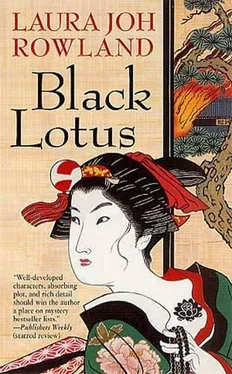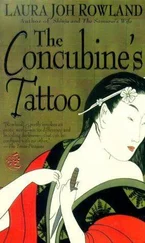“Spurious accusations against other persons are neither evidence nor relevant to the trial of Haru,” Sano argued.
A fleeting, pained expression clouded Magistrate Ueda’s features: He was loath to take sides in a public dispute between Reiko and Sano. Then he said, “Since a life is at stake, I shall grant Lady Reiko the privilege of speaking.”
Rejoicing that his mercy had prevailed over Sano’s objections, Reiko rose and walked toward the dais. As she passed Hirata, she glimpsed his undisguised horror. She knelt beside the shirasu, and Haru welcomed her with a grateful smile. Sano fixed on her a look that seemed to say, Please don’t do this. Trust me, and soon you’ll understand.
Reiko ignored him. In a voice that quavered with nervousness, she described her impressions of Haru as troubled but harmless. She drew courage from her certainty that she was doing the right thing, no matter what Sano thought, and clung to her persistent feeling that events would somehow exonerate Haru. She told about Abbess Junketsu-in, Dr. Miwa, and Kumashiro’s suspiciously determined efforts to blame Haru for the crimes and prevent Reiko from making inquiries into the Black Lotus sect. Reiko mentioned her encounter with Pious Truth and his story of torture, slavery, and murder at the temple.
Mutters of surprise rumbled in the audience. Magistrate Ueda listened in stoic silence, while Sano watched Haru. The girl’s face acquired a strange expression that momentarily unbalanced Reiko. It almost seemed as if Haru didn’t want the Black Lotus maligned. Didn’t she understand that incriminating the sect was to her advantage?
Recovering, Reiko described the murder of Minister Fugatami and his wife, the beating Haru had received in Edo Jail, and the attack on herself and Sano.
“Honorable Magistrate, these incidents represent the Black Lotus’s efforts to destroy its enemies,” she concluded breathlessly. “The sect killed Minister Fugatami to prevent him from censuring it, and tried to assassinate the sōsakan-sama and myself because we were probing its affairs. Its thugs hurt Haru because she refused to confess.” Now Reiko’s voice rang out in a passionate conviction she didn’t feel: “The Black Lotus, not Haru, committed the arson and murders, and has framed her to protect itself.”
A short silence followed. Then Magistrate Ueda said in a neutral tone, “Your points are noted. Now I offer the sōsakan-sama the opportunity to address them.”
Reiko felt her heart sink at the thought that Sano might undo whatever good she’d accomplished.
“Lady Reiko has portrayed you as the innocent victim, slandered and framed by Black Lotus members,” Sano said quietly to Haru. “But it’s not just they who have seen you for what you are.”
Haru gazed up at him, wary and uncomprehending.
“The people who know you best can also attest to your evils,” Sano said, then turned to Magistrate Ueda. “There are two witnesses I didn’t present earlier because their personal situation is sensitive. I request permission for them to testify now.”
Alarm shot through Reiko. Who were these witnesses? What was Sano up to?
“Permission granted,” Magistrate Ueda said.
Sano nodded to Hirata, who left the court, then returned with a middle-aged couple. Both man and woman wore the modest cotton kimonos of peasants. They huddled together, their faces apprehensive.
“I introduce Haru’s parents,” Sano said.
Haru cried joyfully, “Mother! Father!” Shedding her meek, frightened demeanor, she rose up on her knees and leaned toward the couple. “Oh, how I’ve missed you! And now you’ve come to save me!”
But Reiko guessed why Sano had brought them. Filled with dismay, she watched helplessly as Hirata led Haru’s parents up to the dais. They averted their eyes from Haru. Kneeling, they bowed to the magistrate. The mother began weeping quietly; the father hung his head.
“What’s wrong, Mother?” Haru said in confusion. “Aren’t you glad to see me?”
“Your cooperation is much appreciated,” Sano said.
His tone conveyed sympathy for the shame the couple obviously suffered from public exposure at their child’s trial. In response to gentle questions from him, the parents described how they’d married Haru off, and her contradictory stories about the fire that had killed her husband.
“Why are you saying those things?” Haru interrupted, and hurt eclipsed the happiness on her face. “I told you I didn’t set the fire. Why do you want to turn everyone against me?”
Her father regarded her sadly. “We were wrong to hide what we know about you. Now we must tell the truth.”
“And you must face up to what you’ve done,” said her mother, turning a tear-streaked face toward Haru. “Repent, and cleanse the disgrace from your spirit.”
“I haven’t done anything wrong,” Haru protested, beginning to wheeze as she glared at her parents. “You never loved me. No matter how hard I tried to please you, I was never good enough. It’s all your fault that I’m in trouble.”
Sano had kept quiet during this exchange. He’d identified Haru’s feelings for her parents as a vulnerability, Reiko thought, deploring the cruel tactic by which he’d exposed a dark side of Haru. Now he said, “But it wasn’t your parents who committed murder and arson. It was you.”
“They made me marry that horrible old man. I told them how badly he treated me and begged them to let me come home, but they wouldn’t listen.” Louder wheezes rasped from Haru; she squirmed, straining at her bonds. “You didn’t care how I suffered,” she shouted at her parents, who cringed. “All you cared about was the money the old man gave you. I had to protect myself.”
“And that’s why you killed your husband?” Sano said.
“No, no, no!” Haru shrieked, rocking back and forth. “The night he died, he got angry at me for serving him cold tea. He hit me, and his arm knocked over a lamp. It set his clothes on fire. I ran away and let him and his house burn. He deserved to die!”:
The confession descended upon Reiko like a vast iron bell that resonated with her shock and horror. She barely heard the audience’s outcry. Everything seemed hazy. She felt sick because she no longer believed anything Haru said.
“More lies.” Sano addressed the girl with scornful contempt. “I suggest that you threw the lamp at your husband and set him on fire. Did you kill Commander Oyama, too?”
Haru’s resistance suddenly broke into hysteria. “Yes,” she moaned. “Yes, yes!”
Reiko bowed her head, mournfully resigned to the knowledge that Haru had deceived her from the start. She’d compromised her marriage and her vocation over a liar and criminal. There would be no exoneration of Haru, no ultimate justification of Reiko’s defense of the girl. Reiko had made a fool of herself in public and failed to direct the power of the law toward the Black Lotus. Mortified, she looked to see if Sano would acknowledge his victory over her, but he was watching Haru.
“What happened that night at the Black Lotus Temple?” he said.
“Commander Oyama told me to meet him in the cottage. I didn’t want to, but the Black Lotus needed his patronage.” The words rushed from Haru like water pouring through a broken dam. “So I sneaked out of the orphanage. When I got to the cottage, he was already there, naked on the bed. He ordered me to-” Haru’s voice dropped in shame “-to suck on him.
“He said that unless I obeyed, he would stop giving money to the Black Lotus, and Anraku would be angry with me and expel me from the temple. I was afraid he was right, so I knelt and took him in my mouth.” Haru gulped, as if swallowing nausea engendered by the memory. “Suddenly his legs came up around my neck and started squeezing, choking me. I begged him to let go, but he just shouted at me to keep sucking. I broke free, and he started hitting me. He pinned me down on the floor and rammed himself inside me. He was strangling me. Everything started going dark. I was so frightened that he was going to kill me.”
Читать дальше












